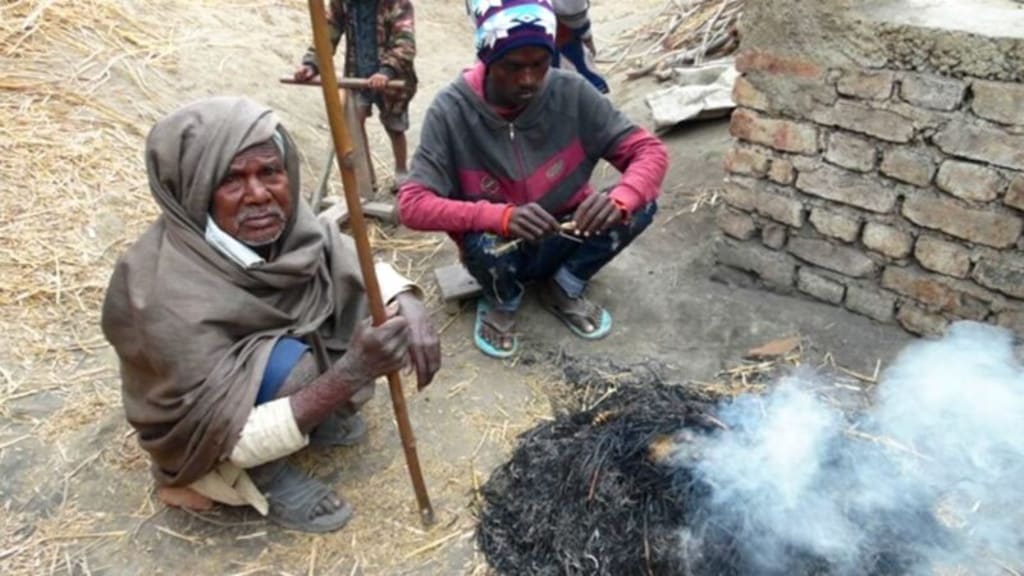Breaking the Chains: The Dom Caste of India and Nepal - A Journey Towards Equality and Recognition
Exploring the Struggles, Initiatives, and Triumphs of the Dom Community in Overcoming Caste-Based Discrimination

Exordium--
Caste systems have been deeply ingrained in the social fabric of many South Asian countries for centuries. These systems, although officially abolished, continue to shape the lives of millions of people, dictating their social status, occupation, and opportunities. Among the numerous castes in India and Nepal, the Dom caste stands as one of the most marginalized and underprivileged groups. In this blog, we will delve into the historical origins, social dynamics, and contemporary challenges faced by the Dom community, shedding light on their struggle for equality and recognition.
Historical Background:
The Dom caste finds its roots in ancient times when society was structured hierarchically based on occupation and birth. Traditionally associated with occupations such as cleaning, sweeping, cremation, and disposal of dead animals, the Dom community faced severe discrimination and social ostracization. Historical records suggest that Doms were often considered untouchable or Dalit, a term used to describe the lowest stratum of the caste system.
Social and Economic Challenges:
The Dom community has historically faced a range of social and economic challenges that continue to persist to this day. Discrimination and prejudice have limited their access to education, healthcare, and employment opportunities. They are often forced to live in segregated settlements on the outskirts of villages and towns, further exacerbating their marginalization. As a result, poverty and lack of social mobility have become defining features of the Dom community.
Cultural Significance and Identity:
Despite the systemic challenges they face, the Dom community holds a significant place in the cultural landscape of India and Nepal. In Nepal, they are involved in the traditional occupation of funeral rites, where they play a vital role in conducting cremations and post-death rituals. Their expertise in these practices has been passed down through generations, making them an integral part of the cultural tapestry of the region.
Struggles for Recognition and Empowerment:
In recent years, there have been concerted efforts to raise awareness about the social injustices faced by the Dom community and empower them to assert their rights. Activists, NGOs, and civil society organizations are working tirelessly to challenge discrimination, promote education, and improve living conditions. Legal measures, such as affirmative action policies, have been implemented to provide opportunities for the upliftment of marginalized communities, including the Dom caste.
Changing Perspectives:
While the journey towards equality remains challenging, there have been instances of positive change and growing acceptance of the Dom community. Awareness campaigns, cultural events, and art forms showcasing the talent and contributions of Doms are slowly shifting public perceptions. As society becomes more inclusive and diverse, there is hope for a future where caste-based discrimination is eradicated, and every individual is treated with dignity and respect.
Ultimately....
The Dom caste in India and Nepal represents a microcosm of the deep-rooted caste system that has shaped South Asian societies for centuries. The historical discrimination, economic challenges, and cultural significance of the Dom community have been explored in this blog. Despite the hurdles they face, there is a growing movement to challenge the status quo and empower marginalized communities. It is essential to continue fostering dialogue, promoting education, and advocating for equal rights, enabling the Dom community and other marginalized groups to break free from the shackles of caste-based discrimination and build a more equitable future for all.
Contemporary Initiatives and Achievements:
In recent years, various initiatives have emerged to address the issues faced by the Dom community and uplift their status. NGOs and grassroots organizations have been actively involved in promoting education among Dom children and providing vocational training to enhance their employability. These efforts aim to break the cycle of poverty and empower individuals to lead more fulfilling lives. Additionally, scholarships and financial assistance programs have been implemented to support higher education for deserving Dom students.
Moreover, the government of both India and Nepal has taken steps to promote social inclusion and uplift marginalized communities. Reservation policies have been implemented to ensure proportional representation and opportunities for historically disadvantaged groups, including the Dom caste. These affirmative action measures aim to bridge the social and economic gap between different castes and provide a pathway for social mobility.
In recent years, there have been instances where individuals from the Dom community have achieved significant milestones in various fields. From academics and entrepreneurship to arts and sports, Dom individuals have broken barriers and showcased their talent and potential. These achievements serve as an inspiration and challenge societal stereotypes associated with their caste.
Intersectionality and Gender Dynamics:
Within the Dom community, the experiences and challenges faced by women deserve special attention. Gender dynamics intersect with caste-based discrimination, leading to compounded marginalization. Dom women often face multiple layers of discrimination, limiting their access to education, healthcare, and economic opportunities. Efforts are being made to empower Dom women through skill development programs, women's collectives, and awareness campaigns to promote gender equality and social justice.
International Conventions and Advocacy:
The Dom community's struggle for recognition and equal rights has gained attention not only at the national level but also within the international community. Organizations like the United Nations and various human rights bodies have acknowledged the need to address caste-based discrimination and promote social inclusion. Advocacy groups have been formed to raise awareness about the Dom community's plight and lobby for policy changes that protect their rights and dignity.
The Way Forward:
Addressing the challenges faced by the Dom community requires a multi-faceted approach involving government intervention, community participation, and public awareness. Education and awareness campaigns can play a crucial role in challenging social prejudices and dismantling stereotypes associated with the Dom caste. Creating safe spaces for dialogue and fostering inter-caste harmony can help bridge the gap between different communities.
Economic empowerment initiatives, such as providing vocational training, access to microfinance, and entrepreneurship support, can uplift the socio-economic status of the Dom community. Furthermore, ensuring equal access to healthcare, clean water, sanitation, and housing will improve their overall well-being and quality of life.
It is also important to emphasize the role of education in transforming societal attitudes towards caste-based discrimination. Incorporating inclusive curricula that promote diversity, tolerance, and empathy can contribute to a more inclusive society. Encouraging partnerships between educational institutions and NGOs can help create scholarships and mentorship programs specifically aimed at supporting Dom students.
Over all...
The Dom community's struggle for equality and recognition remains an ongoing battle against deeply entrenched social hierarchies. However, the collective efforts of activists, organizations, and individuals dedicated to challenging discrimination have shown promising signs of change. Through education, empowerment, and advocacy, the Dom community can aspire to a future where caste-based discrimination is relegated to history, and every individual is afforded equal opportunities and dignity. It is our collective responsibility to work towards a society that embraces diversity, celebrates individuality, and ensures justice for all, regardless of caste or social background.
Regional Variations and Challenges:
While the Dom community faces common challenges in both India and Nepal, it's important to acknowledge the regional variations and nuances that exist within each country. In India, the Dom caste is predominantly found in various states across North India, such as Uttar Pradesh, Bihar, Rajasthan, and Madhya Pradesh. In Nepal, they are primarily concentrated in the Kathmandu Valley and the Terai region. The regional variations influence the socio-cultural dynamics and the specific challenges faced by the Dom community.
For instance, in India, where the caste system has been deeply ingrained for centuries, the discrimination faced by the Dom community is often deeply rooted in societal attitudes and practices. They are subjected to social exclusion, restricted access to public spaces, and limited opportunities for upward mobility. Additionally, inter-caste marriages and social interactions beyond their assigned roles face resistance and hostility from dominant castes.
In Nepal, the Dom community's association with funeral rites and their involvement in practices considered "polluting" by some sections of society can lead to social stigma and discrimination. Despite their invaluable role in performing last rites, they often face marginalization and limited access to resources and opportunities. The socio-cultural context in Nepal, with its distinct history and social structures, presents its own unique challenges for the Dom community.
The Role of Education and Awareness:
Education and awareness play a vital role in challenging the deep-rooted biases and stereotypes associated with the Dom caste. By promoting education among Dom children and providing opportunities for higher education, individuals from the community can gain the knowledge and skills necessary to overcome social and economic barriers. Education also helps in fostering critical thinking, empowering individuals to challenge discriminatory practices and work towards a more inclusive society.
Furthermore, awareness campaigns aimed at dispelling myths and stereotypes associated with the Dom community can contribute to changing societal attitudes. Media, literature, and art can play a significant role in highlighting the contributions and achievements of Dom individuals, portraying them in a positive light, and challenging prevalent prejudices.
Collaborative Efforts and Community Empowerment:
Addressing the challenges faced by the Dom community requires collaborative efforts involving multiple stakeholders. NGOs, community-based organizations, and government agencies need to work in tandem to create sustainable solutions. Community empowerment should be at the forefront of these efforts, ensuring that the Dom community has a say in decisions that affect their lives and are actively involved in the process of change.
Creating platforms for dialogue and interaction between the Dom community and members of other castes can promote understanding, empathy, and social cohesion. Engaging in community-driven initiatives such as vocational training programs, skill development workshops, and entrepreneurship support can enhance the economic prospects of the Dom community. By providing opportunities for income generation and self-sustainability, individuals from the community can break free from the cycle of poverty and achieve greater social mobility.
Thus...
The Dom community's struggle for equality and recognition represents the broader fight against caste-based discrimination in India and Nepal. While the challenges they face are formidable, there is hope in the collective efforts being made to challenge societal norms, empower individuals, and promote inclusivity. By addressing educational disparities, dispelling stereotypes, and fostering community empowerment, we can pave the way for a society where individuals from the Dom caste, and other marginalized communities, can live with dignity, equality, and the opportunity to fulfill their aspirations. It is our shared responsibility to work towards a more just and inclusive society, one that transcends the boundaries of caste and ensures the fundamental rights of every individual.
The Importance of Legislative Reforms:
Legislative reforms are crucial in addressing the systemic discrimination faced by the Dom community. In both India and Nepal, constitutional provisions and laws have been enacted to protect the rights of marginalized communities, including the Dom caste. Affirmative action policies, such as reservation quotas in education and government employment, aim to provide opportunities for social upliftment and representation.
However, effective implementation and enforcement of these laws remain a challenge. Often, the benefits of these policies do not reach the intended beneficiaries due to various factors, including corruption, lack of awareness, and administrative hurdles. It is imperative that governments take proactive measures to ensure the proper implementation of these laws, monitor their impact, and address any gaps or shortcomings.
Additionally, comprehensive anti-discrimination legislation needs to be enacted to specifically address caste-based discrimination. Such laws would provide legal recourse to individuals from the Dom community who face discrimination, prejudice, or violence based on their caste. They would also serve as a deterrent, signaling the society's commitment to eradicating caste-based discrimination in all its forms.
The Role of Civil Society and International Support:
Civil society organizations, activists, and NGOs play a crucial role in advocating for the rights and welfare of the Dom community. They work tirelessly to raise awareness, provide support services, and engage in advocacy efforts to address the systemic challenges faced by the community. These organizations often collaborate with international partners, human rights groups, and NGOs to amplify their voices and access resources and expertise.
International support and solidarity are essential in addressing the issue of caste-based discrimination. The United Nations and other international bodies have recognized caste-based discrimination as a form of human rights violation and have called for its eradication. Through international forums, conferences, and dialogues, the issue of caste discrimination gains visibility and support, putting pressure on governments to take action and prioritize the rights of marginalized communities.
Lastly...
The Dom community's journey towards equality and recognition is a testament to the resilience and determination of marginalized communities in India and Nepal. While significant challenges persist, progress is being made through collective efforts, legislative reforms, and social awareness. The struggle against caste-based discrimination requires a comprehensive approach, encompassing education, economic empowerment, legal reforms, and social transformation.
As individuals, we have a responsibility to challenge our own biases, educate ourselves about the history and realities of caste discrimination, and actively work towards dismantling caste-based hierarchies. By promoting inclusivity, empathy, and equal opportunities, we can contribute to a more just and equitable society, where every individual, regardless of their caste, can thrive and live a life of dignity.
Together, let us strive for a future where the Dom community and all marginalized groups in India, Nepal, and beyond are no longer defined by their caste but are recognized for their inherent worth, talents, and contributions to society. It is through collective action and unwavering commitment that we can build a world free from caste discrimination and ensure social justice for all.
Continued Advocacy and Awareness:
Sustaining advocacy efforts and raising awareness about the issues faced by the Dom community is crucial for lasting change. It is essential to engage in ongoing dialogue, not only within the community but also with members of other castes, civil society, and policymakers. Public campaigns, social media initiatives, and community events can help educate the wider society about the realities of caste discrimination and promote solidarity.
Promoting inter-caste marriages and social interactions can also contribute to breaking down the barriers of caste-based discrimination. Encouraging individuals from different castes to come together in marriage and relationships fosters greater understanding, acceptance, and equality. It challenges the rigid social norms and prejudices that perpetuate caste-based discrimination.
Empowering Youth:
Empowering the youth within the Dom community is pivotal for driving change and shaping a more inclusive future. Investing in education, skills development, and leadership training for young individuals from the Dom community can equip them with the tools and knowledge to challenge societal norms, advocate for their rights, and become agents of change.
Creating mentorship programs and scholarships specifically tailored for Dom youth can provide them with opportunities to explore their potential, pursue higher education, and develop the skills needed for personal and professional growth. Empowered Dom youth can become role models for future generations and contribute to dismantling the barriers of caste-based discrimination.
International Solidarity:
The Dom community's struggle for equality and recognition is not limited to India and Nepal alone. Caste-based discrimination exists in various forms in other countries as well. Building international solidarity among marginalized communities facing similar challenges can amplify their voices and create a broader movement for change.
International organizations, human rights groups, and activists must continue to highlight the issue of caste-based discrimination on a global scale. Sharing best practices, experiences, and resources can strengthen the fight against caste discrimination and foster collaboration to address common issues faced by marginalized communities worldwide.
So...
The Dom community's journey towards equality and recognition is an ongoing struggle that requires sustained efforts from individuals, communities, governments, and international organizations. By promoting education, empowerment, legislative reforms, and social transformation, we can strive towards a society where caste-based discrimination is eradicated and every individual is treated with dignity, respect, and equal opportunities.
It is incumbent upon all of us to challenge the deeply entrenched caste-based prejudices and biases within our societies. By embracing diversity, fostering inclusivity, and advocating for the rights of marginalized communities, we can contribute to building a more just and equitable world.
Let us stand in solidarity with the Dom community and all marginalized groups, working together to break the chains of caste-based discrimination and create a future where every individual, regardless of their caste or social background, can live a life of dignity, equality, and opportunity. Only through collective action and unwavering commitment can we bring about the transformative change that is needed to create a truly inclusive society.
About the Creator
Enjoyed the story? Support the Creator.
Subscribe for free to receive all their stories in your feed. You could also pledge your support or give them a one-off tip, letting them know you appreciate their work.






Comments
There are no comments for this story
Be the first to respond and start the conversation.